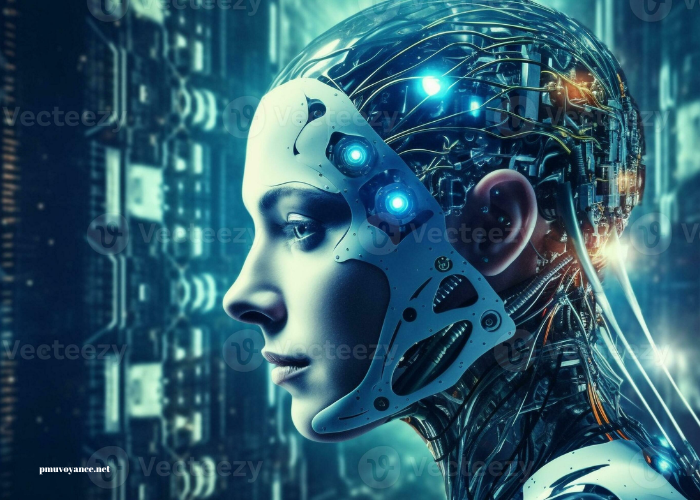The advent of Artificial Intelligence (AI) marks a pivotal moment in the evolution of technology and industry. As we stand on the threshold of the Fourth Industrial Revolution, AI is emerging as a driving force, reshaping economies, industries, and the very fabric of our daily lives. This article delves into the transformative power of AI, exploring its impact across various sectors, its challenges, and its potential to create a better future.
Understanding AI and Its Capabilities
Artificial Intelligence encompasses a broad range of technologies that enable machines to simulate human intelligence. These technologies include machine learning, natural language processing, computer vision, and robotics. By leveraging vast amounts of data and complex algorithms, AI systems can perform tasks such as analyzing patterns, predicting outcomes, and making decisions.
The capabilities of AI are vast, with applications ranging from simple tasks like chatbots providing customer service to complex operations like autonomous vehicles navigating city streets. The ability to process and analyze large datasets at high speed gives AI an edge over traditional methods, making it a vital tool for businesses aiming to innovate and improve efficiency.
Transforming Industries
Healthcare
One of the most promising applications of AI is in the healthcare sector. AI technologies are revolutionizing how healthcare providers diagnose, treat, and manage diseases. Machine learning algorithms analyze medical images to identify anomalies such as tumors or fractures, often with higher accuracy than human radiologists. For example, companies like Zebra Medical Vision and Aidoc utilize AI to assist radiologists in detecting medical conditions earlier, leading to timely interventions and improved patient outcomes.
Moreover, AI-driven predictive analytics help in personalized medicine by analyzing a patient’s genetic makeup and lifestyle factors to tailor treatments. This shift toward individualized care enhances treatment effectiveness and minimizes adverse effects.
AI is also streamlining administrative tasks in healthcare, reducing the burden on medical staff. Natural language processing applications can automate the documentation process, allowing healthcare providers to focus more on patient care rather than paperwork.
Finance
In the finance industry, AI is reshaping how institutions assess risk, detect fraud, and make investment decisions. Algorithms can analyze transaction patterns in real-time, identifying anomalies that may indicate fraudulent activity. Companies like PayPal and Mastercard leverage AI-driven systems to enhance security and protect customers from cyber threats.
AI also plays a crucial role in investment strategies. Robo-advisors, powered by machine learning algorithms, analyze market data and make investment recommendations tailored to individual clients. This democratization of investment advice is making financial planning more accessible to a broader audience.
Furthermore, AI assists in credit scoring, enabling lenders to assess creditworthiness more accurately. Traditional credit scoring methods often overlook individuals with limited credit histories. AI models can incorporate alternative data sources, providing a more comprehensive view of an applicant’s financial behavior.
Retail
The retail industry is experiencing a significant transformation due to AI. E-commerce giants like Amazon and Alibaba employ AI algorithms to enhance customer experiences through personalized recommendations. By analyzing purchasing behavior and preferences, these companies can suggest products tailored to individual customers, increasing sales and customer satisfaction.
In physical retail spaces, AI-powered systems are optimizing inventory management and supply chain operations. Machine learning models forecast demand more accurately, helping retailers maintain optimal stock levels and reduce waste. Additionally, computer vision technology is being utilized for checkout-free shopping experiences, allowing customers to skip the checkout line entirely.
AI also enhances customer service through chatbots and virtual assistants, providing instant support and resolving inquiries 24/7. This not only improves customer satisfaction but also reduces operational costs for businesses.
Manufacturing
AI is driving efficiency and innovation in the manufacturing sector. Smart factories equipped with IoT devices and AI analytics are enabling real-time monitoring of production processes. Predictive maintenance powered by machine learning can anticipate equipment failures before they occur, minimizing downtime and saving costs.
Robotics, combined with AI, is revolutionizing production lines. Collaborative robots, or cobots, work alongside human operators, enhancing productivity and safety. For instance, companies like Fanuc and ABB are deploying AI-driven robots that adapt to their environments, making them more versatile and efficient.
Additionally, AI-driven quality control systems utilize computer vision to inspect products for defects, ensuring high-quality standards are maintained throughout the manufacturing process. This reduces waste and enhances customer satisfaction.
Transportation
The transportation industry is undergoing a seismic shift due to AI innovations. Autonomous vehicles are at the forefront of this transformation, promising safer and more efficient travel. Companies like Waymo and Tesla are leveraging AI to develop self-driving technology that can navigate complex urban environments.
AI is also optimizing logistics and supply chain management. Machine learning algorithms analyze traffic patterns, weather conditions, and delivery routes to optimize shipping processes. Companies like UPS and FedEx are employing AI to improve delivery times and reduce costs.
Moreover, AI-powered systems enhance fleet management by monitoring vehicle performance and driver behavior, leading to increased safety and efficiency. This data-driven approach allows companies to make informed decisions about maintenance, routing, and fuel consumption.
Agriculture
Agriculture is another sector experiencing a significant transformation through AI. Precision agriculture employs AI technologies to optimize farming practices, enhancing crop yields while minimizing environmental impact. Drones equipped with AI-powered sensors collect data on crop health, soil conditions, and weather patterns, allowing farmers to make informed decisions.
Machine learning algorithms analyze this data to provide insights on irrigation, fertilization, and pest control. By tailoring agricultural practices to specific field conditions, farmers can increase efficiency and sustainability.
Additionally, AI is facilitating the development of autonomous farming equipment, such as tractors and harvesters, reducing labor costs and increasing productivity. This innovation is particularly vital in addressing labor shortages in the agricultural sector.
Challenges and Considerations
While the potential benefits of AI are immense, its adoption also presents several challenges. Ethical considerations surrounding data privacy, bias in algorithms, and job displacement are critical issues that need addressing.
Data Privacy
The reliance on vast amounts of data for training AI models raises concerns about data privacy. Ensuring that personal information is protected and used ethically is paramount. Companies must adopt transparent practices and comply with regulations such as the General Data Protection Regulation (GDPR) to safeguard user data.
Bias and Fairness
AI systems are only as good as the data they are trained on. If the training data contains biases, the resulting AI models may perpetuate those biases, leading to unfair outcomes. For instance, biased algorithms in hiring processes can discriminate against certain groups. Addressing bias requires diverse datasets and ongoing monitoring of AI systems to ensure fairness.
Job Displacement
As AI automates routine tasks, concerns about job displacement are prevalent. While AI can enhance productivity, it may also lead to job losses in certain sectors. However, history has shown that technological advancements often create new jobs and opportunities. Upskilling and reskilling the workforce will be crucial in navigating this transition.
The Future of AI
The future of AI holds tremendous potential for further transformation across industries. As technology continues to evolve, AI will likely become more integrated into everyday processes, enabling organizations to operate more efficiently and sustainably.
Enhanced Collaboration
The future will see increased collaboration between humans and AI. Rather than replacing human workers, AI will augment their capabilities, enabling them to focus on complex problem-solving and creativity. This collaboration will drive innovation and foster a more dynamic work environment.
Sustainable Practices
AI can play a significant role in promoting sustainability. By optimizing resource allocation, reducing waste, and enhancing energy efficiency, AI technologies can contribute to more sustainable practices across industries. For instance, AI-driven analytics can help companies minimize their carbon footprint by optimizing logistics and supply chains.
Continuous Learning
As AI systems become more advanced, they will be capable of continuous learning and adaptation. This capability will enable businesses to respond more effectively to changing market conditions and customer preferences, fostering resilience in an ever-evolving landscape.
Conclusion
The AI revolution is undeniably transforming industries for the better, offering unprecedented opportunities for innovation, efficiency, and growth. As we embrace this technological shift, it is essential to address the challenges that accompany it, ensuring that AI is developed and deployed responsibly.
By harnessing the power of AI, businesses can create more personalized experiences, enhance productivity, and drive sustainable practices. The future of AI is bright, and its potential to reshape our world for the better is limitless. Embracing this revolution will require collaboration between technologists, policymakers, and society as a whole, ensuring that the benefits of AI are realized by all.



